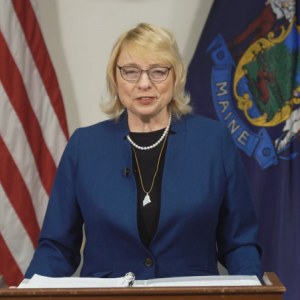Gov. Mills accelerates ‘clean transportation’ plan to accomplish Maine’s climate goals
AUGUSTA — Governor Janet Mills signed an executive order Friday to accelerate Maine’s progress in reducing greenhouse gas emissions from transportation, by calling for a “clean transportation roadmap” to achieve the state’s climate plan goal of increasing the number of electric vehicles (EVs) on the road in Maine by 2030.
The roadmap, due by December, will develop recommendations to enhance the EV market in Maine, expand charging infrastructure, evaluate effects on electric utilities and the grid, and ensure an equitable and affordable transition to clean transportation for all people in Maine, according to a news release.
Reducing emissions from transportation – which is the source of more than half of all greenhouse gas emissions in Maine – is a key piece of Maine’s overall effort to curb state emissions by 45% by 2030, the release noted
The state’s climate action plan, Maine Won’t Wait, estimates Maine needs 219,000 light-duty EVs on the road by 2030 to meet its emissions targets.
Currently, EVs account for fewer than one percent of registered vehicles in Maine. However, the amount of EVs is expected to grow in coming years due to advancing technology, reductions in cost, increasing consumer demand, and commitments from the federal government, state governments, and major auto manufacturers to accelerate the transition to EVs.
Work on the clean transportation roadmap will be led by the Governor’s Office of Policy Innovation and the Future and the Governor’s Energy Office, in concert with the Maine Department of Transportation, the Maine Department of Environmental Protection, and the Efficiency Maine Trust.
“Growing the number of clean vehicles in Maine to reduce greenhouse gas emissions related to transportation is a key opportunity to address climate change in Maine,” said Hannah Pingree, Director of the Governor’s Office of Policy Innovation and the Future, and co-chair of the Maine Climate Council. “The clean transportation roadmap will make recommendations to ensure Maine consumers have affordable options for EVs, and access to charging infrastructure that meets the needs of rural and urban drivers alike.”
“A clean transportation roadmap is a proactive step that will allow Maine to address future transportation needs while contributing to the work against climate change.” said Bruce Van Note, Commissioner of the Maine Department of Transportation. “Increased consumer interest in electric vehicles coupled with delivery commitments from automakers will help put us on a path to a clean transportation future.”
“As electric vehicle technology advances and more models become available to consumers, Maine needs to ensure we have an electric grid that can support this growth,” said Dan Burgess, Director of the Governor’s Energy Office. “The clean transportation roadmap will begin to address the grid impacts and rate design needs to support this transition, grow the clean energy economy, and make significant progress against climate change.”
The governor’s executive order follows the release this week of the state’s first Lead-By-Example plan, which establishes climate, clean energy, and clean transportation targets for state agencies.
To support the state’s clean transportation goals in the Lead-By-Example plan, the Efficiency Maine Trust this week announced the availability of $200,000 of Volkswagen settlement funds to install publicly available electric vehicle charging stations at state office locations.
Another key aspect of the clean transportation executive order, in addition to the roadmap, is the creation of a recognition program for auto dealers and other businesses, local governments, and nonprofits for leadership on clean transportation. The program would be developed and administered by the Governor’s offices and the Efficiency Maine Trust.
Event Date
Address
United States



























